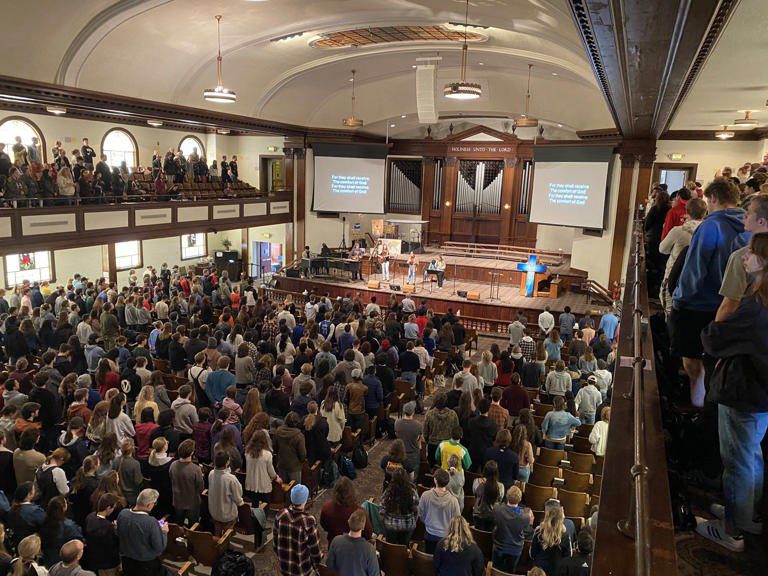If it stays true to the call of the Hebrew prophets, the Asbury revival won’t stop at summoning people to personal piety.
By Andre Henry , Written in Protest
(RNS) — Over the past few weeks, Asbury University in Kentucky has seen its regularly scheduled chapel services spontaneously erupt into a weekslong worship and prayer session. As news of what people are calling a revival spread, students at Lee University in Tennessee, Cedarville University in Ohio and, most recently, Texas A&M University have all begun their own versions.
The New York Times estimated more than 50,000 people descended on the small campus chapel in Wilmore, Kentucky to experience the nation’s first major spiritual revival in decades – one driven by Gen. Z. And, Times religion writer Ruth Graham’s front-page story noted that the spontaneous, 16-day gathering that ended Thursday (2/23) was like “’Woodstock’ for Christians.”
These alleged spiritual awakenings have ignited hope among many Christians, and suspicion. Some watching these events have asked: “How do we know this is a legitimate work of God?”
The question is understandable: In a nation where some white people have invoked Christ’s name to justify a drift toward neofascism, news of a “revival” on predominantly white Christian campuses raises eyebrows.

The renowned British 20th-century revivalist Leonard Ravenhill, author of the 1959 classic “Why Revival Tarries,” would likely respond that the standard of measure for any alleged move of God is repentance. As a 21st-century Black man, I’d push that further: “Repentance” in the current moment, when white people in a white supremacist society are already experiencing a sort of secular revival of fascist zeal, must connect somehow with anti-racism.
The Hebrew prophets, whose sermons are found in the Christian Bible, might agree. Micah, Amos, Hosea, and Isaiah consistently connect zeal for God with social justice.
When Micah said “What does the Lord require of you? To act justly and to love mercy and to walk humbly with your God,” he was speaking to neighbors who’d recently rediscovered a passion for the religion of YHWH.
Isaiah preached a similar sentiment, saying, “Is not this the kind of fasting I have chosen: to loose the chains of injustice and untie the cords of the yoke, to set the oppressed free and break every yoke?”
Amos echoed these two, saying, “Away with the noise of your songs! I will not listen to the music of your harps. But let justice roll on like a river, righteousness like a never-failing stream!”
For the biblical prophets, the worshipping community’s comfort with injustice stands in contradiction to its religious fervor. That contradiction can only be undone when the worshipping community channels its sudden religious zeal into social action aimed at ending oppression.
American great revivals of the 18th and 19th centuries are decent — although imperfect — models, as they made subverting America’s racial hierarchy part of their work. The revival meetings of the Second Great Awakening are credited for their part in inspiring the abolitionist movement against chattel slavery. Some historians suggest the movement spurred many Americans to adopt “renewed morals, which centered around the idea that all men are created equal in the eyes of God.”
The Azusa Street Revival, which began in 1906 under the preaching of a Black Holiness preacher, William J. Seymour, included integrated worship services, in that way being a form of civil disobedience.

As revival meetings move away from Asbury’s campus, and continue to pop up around the country, the alleged outpouring of the Holy Spirit is liable to be co-opted by charismatic Christian nationalists, some of whom traveled to Kentucky to be part of the goings-on. Other pastors tweeted their support, trying to claim the young people’s fervor for white conservative ideals.

If it stays true to the call of the Hebrew prophets, the Asbury revival won’t stop at summoning young people to personal piety but will spur a passion for the complete abolition of oppressive institutions. It will prompt repentance, a turning away from America’s original sin of systemic racism to follow Jesus’ greatest commandment — to love one’s neighbor — to its logical conclusion.
One can only hope.
First published Feb. 23, 2023


